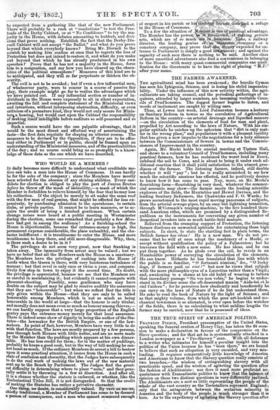WHO WOULD BE A MEMBER ?
IT daily becomes more difficult to understand what creditable mo- tive can take a man into the House of Commons. It can hardly be for the sake of the company ; since the Members have mostly been selected for the absence of any shining abilities. Every can- didate for election is obliged to play the part of Junius Brutus before he threw off the mask of imbecility,—a mask of which the Member is forbidden to relieve himself, by the fear that he may lose his reelection. If the object be merely to sit under the same roof with the few men of real genius, that might be effected far less ex- pensively, by purchasing admission to the operahouse, to certain clubs, or private parties. It cannot be to learn manners, or to ac- quire the credit of being a finished gentleman. When certain strange noises were heard at a public meeting in Westminster during the election, some one remarked that probably a few Mem- bers had got in among the audience ! As a finishing-school the House is objectionable, because the entrance-money is high, the permanent expense considerable, the place unhealthy, and the cha- racter indifferent : it is troublesome to enter the House, and more troublesome to keep there, and still more disagreeable. Why, then, is there such a desire to be in it ?
The privileges do not seem very great, now that franking is taken away. The immunity from arrest may be valued ; but we have no belief that all the Members seek the House as a sanctuary. The Members have the privilege of rushing into the House of Lords when the Queen is there, with very boisterous turbulence of manner : but that revel is only once or twice a year, and compara- tively few stop in town to enjoy it the second time. No doubt, the privilege is appreciated, because we see that the Members are so careful in maintaining it ; but evidently it cannot compete with pheasant-shooting. Possibly, some gentlemen who may have doubts on the subject may be glad to receive audibly the assurance that they are " honourable" : but when we reflect that the title is only given within the House—that they are only to be called honourable among Members, which is not so much as being honourable in the world at large—that the honour is only titular, and morally, does not mean even so much as honour among thieves,— we can hardly suppose that a very large proportion of the English gentry pays the entrance-money merely for that local assurance. There is indeed some show of dignity in being the author of the Sta- tutes—the lawmaker for the British Empire, or one of the law- makers. In point of fact, however, Members have very little to do with that function. The laws are mostly prepared by a few persons, pass through both Houses with little notice, and are no more made by the Member than the pudding which appears at his own dinner- table. He has less credit for them ; for in the matter of puddings, probably he keeps a good cook, but in the way of bill-making he can- not boast as much. If the ordinary Members do arrest a bill to bestow upon it some practical attention, it issues from the House in such a state of confusion and obscurity, that the Judges have subsequently to do the real work of making the laws out of the raw material sent up to the Bench by Parliament. The Judges find the great- est difficulty in determining where to place "mats," and they gene- rally settle it by throwing in a few at discretion. And after all, it is a chance whether the statute is enforced, or whether, like the Ecclesiastical Titles Bill, it is not disregarded. So that the credit of making the Statutes has rather a privative character.
One thing, no doubt, is considerably valued. By various menus, chiefly traditional, a Member of Parliament has oome to be deemed a person of consequence, and a man who cannot command enough
of respect in his parish or histraiWydosilliPliold a refuge in the House of Commons.
To a few the situation of .Linbay-,iis one of.pFaeticid advantage. The Member has the power' 110.7ik teeellectea, of king private
acts, which are of so much 7htis, a railway director, the leading genius of feitrisfassanee Aompany or a
cemetery company, may prove that -490y-expended for en-
trance to Parliament is simply a good eat : and against the sagacity of such men there is nothing to said. Another class
of more unsettled adventurers also find a convenience in belonging to the House : with many quasi-commercial companies one quali- fication for the directorate is to have the right of placing "M.P." after your name.


























 Previous page
Previous page